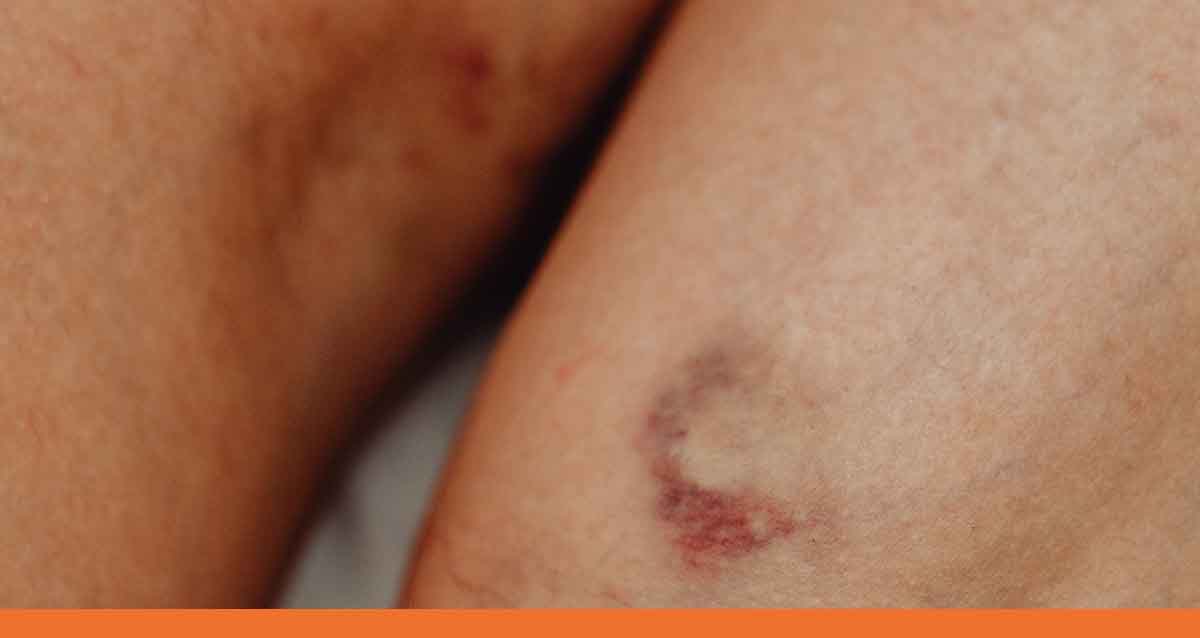
When you get a bruise, it can be painful and unsightly. In addition, you may wonder how long the bruising will last or what treatments are available to help speed up the healing process. Understanding these types of bruises — including causes, prevention techniques, and treatment methods — can help West Hartford, CT, residents manage their injuries and take appropriate steps to heal quickly while minimizing pain or discomfort.
This blog post will explore how long bruises typically last and provide strategies for accelerating recovery time. We’ll also look at preventative measures to keep future bruising at bay. Continue reading to learn more about managing and preventing bruises!
Bruises, or contusions, are common ailments when an injury causes small blood vessels under the skin to break. They often appear as bluish-purple marks on the skin and can range from mild to severe depending on the damage caused by the injury. Bruises typically start with a pink or red color right after the injury and then become more purplish or blue over time due to increased pigmentation of the discolored area. As they heal, they will eventually settle into brown or yellow hues before fading away completely.
While typical bruises go away after a couple of days and some ointments, it is essential to note that bruises caused by trauma may take longer to heal due to inflammation. While the duration of a bruise can vary, there are some general time frames for different types of bruises:
It’s important to note that medical attention may be necessary if a bruise lasts longer than expected or is accompanied by other symptoms, such as severe pain or difficulty moving the affected area. So, if you suspect a severe injury, it’s best to go to a qualified medical provider from reputable urgent care in West Hartford, CT, without delay.

In medical terms, bruises are areas of discolored tissue where localized damage has occurred. The typical appearance of a bruise is its dark purplish cobalt blue or reddish color. Though many different types of bruises can be broken down into two categories: hematomas and contusions.
Individuals need to familiarize themselves with bruising identification to quickly determine if the traumatic event resulted in superficial damage or if more extensive medical care in nearby urgent care in West Hartford, CT, is necessary.
Healing is a complex process that requires the body and mind to work together. Several factors come into play for successful healing, whether from a physical injury, illness, or mental health issue.
Bruises can be painful and unsightly, but several home remedies can help reduce their duration and severity. Rest, Ice, Compression, and Elevation (RICE) Method is one of the most effective ways to reduce the duration of a bruise.
This method involves:

It’s important to remember that while home remedies can help reduce the duration of a bruise, they are not a substitute for medical attention if necessary. Always consult a healthcare professional with concerns about a bruise or other injury.
In general, watch out for these symptoms as a sign for you to go to a nearby urgent care clinic:
Bruising is a common injury that can occur due to physical trauma, and it is often seen in sports players and athletes. However, some bruising can indicate more serious underlying problems, including problems related to the circulatory system. Several risks are associated with bruisings, such as anemia or other blood disorders, cardiovascular disease, lung cancer, or other cancers that spread through the bloodstream.
Understanding the possible risks of bruising is essential to ensure that you take the necessary steps to protect yourself from potential issues. In addition, if you notice any new or persistent bruises on your body, you must contact your doctor immediately so they can assess any underlying health concerns at play.

In general, minor bruises do not require urgent medical attention and can be treated at home with self-care measures like rest, ice, compression, and elevation. However, if you experience any of the following symptoms, you should consider seeking medical attention at an urgent care or emergency department:
Additionally, if you are taking blood thinning medications, have a bleeding disorder, or have a history of frequent or unexplained bruising, you should consult a healthcare professional for guidance on managing your bruise. If you are unsure whether you need medical attention, it’s always better to err on the side of caution and seek the advice of a healthcare provider in nearby urgent care in West Hartford, CT.
Bruising is an all too common occurrence in our lives. In some cases, the bruising can be minor, but it can be a sign of something more severe for others. Understanding the signs and symptoms to look out for can help people take action quickly if a bruise is caused by something other than physical trauma.
It is also essential to remember that prolonged bruises do not always indicate a medical condition but may need to be monitored and treated. Treatment options vary based on factors such as age, overall health, and severity of the bruising episode. If you or someone you care about has any concerns or questions regarding bruising or extended healing times, consider taking them to DOCS Urgent care – West Hartford, where they can get quick and effective diagnoses and treatments that will help restore well-being quickly.

During this surge in COVID-19 cases, our primary focus is meeting the high demand for tests, and we are seeing higher than usual wait times. This means we are unable to answer most phone calls. Please know that our teams are working very hard during this time to care for as many patients as safely as possible. Please click the button below for answers to common questions. We appreciate your understanding.